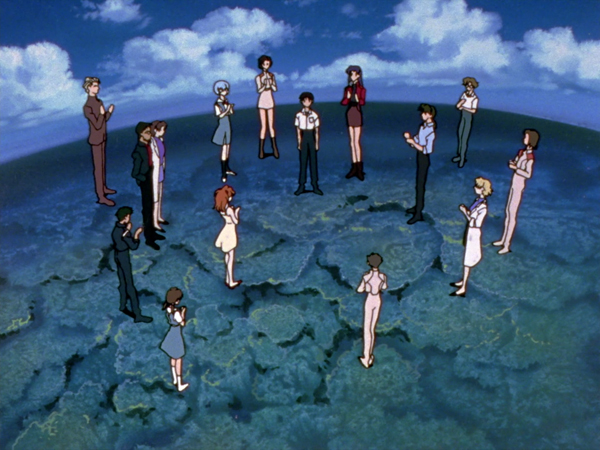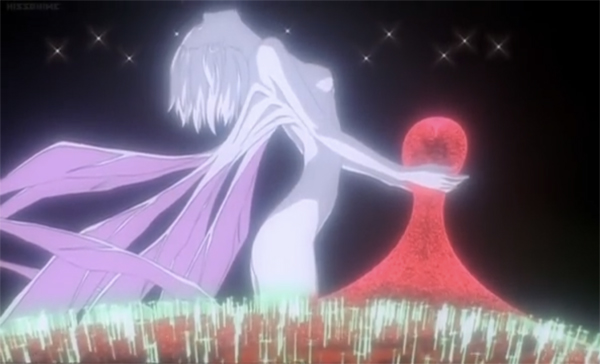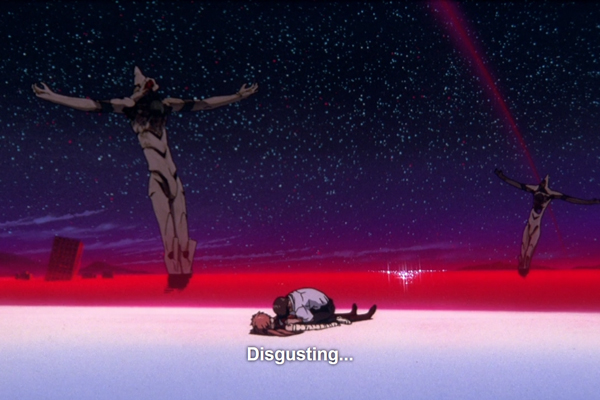


| 
|
 |
On this issue of What's Up, we're talking about anime. A tad interesting considering that two weeks ago, I was talking about football in this space and today, I'm talking about Japanese animation. What can I say... I have diverse interests. Truth be told, I am an anime fan. For some of you, this isn't new, as you know I was an on-air host for Anime Expo for a couple of years back in the day (and I should probably put a couple of the interviews I did online on YouTube or something). Saturday nights on Adult Swim - especially circa 2008 - were chock full of goodies. It was a buffet of hits with such great series like Fullmetal Alchemist (the original, pre-Brotherhood), Eureka Seven, and of course, Ghost in the Shell: Stand Alone Complex. Around that time, I was also able to get The Anime Network on demand through my cable provider where I able to catch some classics as well. That was when I got my first run-through of today's topic: NEON GENESIS EVANGELION It has been labeled as one of the most influential anime series of all time, and you apparently can see its fingerprints on a lot of anime that has come since. You know how The Little Mermaid kickstarted the Disney Renaissance in the 1990's? Neon Genesis Evangelion is in the same league, having kickstarted the anime renaissance in the 1990's, and made otaku culture mainstream. Some even argue that this series gave birth to cosplay. I remember seeing it for the first time in the late 2000's, enjoying it, but finding it a little confusing. Fast forward to a few weeks ago, and what do I find just sitting there in Netflix, begging to be watched. Why, if it isn't Neon Genesis Evangelion. Bonus, it has The End of Evangelion movie to boot, which I had NOT seen before (more on this later). I normally try to be as spoiler-free as possible when I write something like this, but has the anime is over 20 years old, and some secrets gotta be spilled to make sense of what I'm going to say (and even then, it might not help), some details will be spoiled. If you are new to anime in general, and come to this series without any idea of what to expect, you are set up to believe that Neon Genesis Evangelion is more-or-less a "giant robot" anime. Ok, that's cool. However that, my good reader, is just the tip of the iceberg. Perfectly summed up by our friends at Wikipedia: Dare I say, even that sort of undersells it. In a nutshell: everyone has got issues (ESPECIALLY parental issues); there is rampant religious symbolism everywhere, which may or may not be relevant to the story; there is extreme (yet subtle) horniness throughout the series; and there are giant robots... one of which may have the soul of the kid's dead mother in it. And the spoilers begin. With me so far? If you want to bail out now, I totally get it. Still here? Great; let's continue. There are shadowy organizations at work here - specifically SEELE and the organization they "oversee," NERV - who all have the same goal, but for different reasons. That goal is called the Human Instrumentality Project. Instrumentality seeks to remove the emotional barriers between people which will have the result of turning physical individual human into a singular planet-wide pool of primordial goo (in-universe know as "LCL") with a singular consciousness. Kicker, this is NOT for malicious reasons, but for benevolent ones (you never have to feel loneliness or alienation when you're just part of a collective whole). The robots are called Eva units, and they are tasked with protecting the populace of the world - but mainly Tokyo-3 - against entities called "Angels." The Eva units are piloted by three 14 year-olds (because... anime) and we get to witness their lives.
Everyone is suffering some sort of existential crises. But hey, GIANT ROBOTS! Seriously though, as you watch the series, you quickly grow attached to these characters and their stories. You want to find out how things play out for them, because while they are all damaged, they are sort of relatable. It doesn't hurt that they are incredibly bad-ass when needed, as they constantly rise to the occasion, overcoming a slew of both internal and external obstacles... most of the time. The series is just one season long with 26 episodes. The first 24 is the build of the story, with progress made steadily. Overall, it's an even blend of action, teen angst, and a lot of exposition. The last two episode are positioned as the big climax... and it made zero sense. None. It turns out that Instrumentality did occur, off-screen, between episodes 24 and 25. Yup, the big story pay-off happened and no one saw it. The hows and whys of how the climax went down are just skipped completely. The final two episodes take place in Shinji's mind. This was (allegedly) a conscious decision made the writer, Hideaki Anno. We watch as Shinji, who had constantly shunned everyone throughout the series when the going got tough (it's CLEARLY established that he runs away when things go sideways), finally accepts that being alone is not a way to live, and he needs people in his life. Everyone appears, even dead characters, out of nowhere in the final scene and applaud and congratulates Shinji. Roll credits.  That's it. What?!?!? All the backstory, all the symbolism, all the intricate details... simply washed away. Shinji likes people now. Thanks for coming. Mmmmkay. All the subpar finales we've gotten in the last 20 years - Lost, How I Met Your Mother, etc. - are gold compared to this. A brief interlude. Are you familiar with the Justice League movie? The one started by Zack Snyder, who then replaced with Joss Whedon, who sorta re-shot the whole movie? Ya, that one. Justice League came out, and people were pretty "meh" about it. Zack Snyder started dropping hints that this was nowhere near his vision, and his would have been better. Debatable, but ok. You can't fault the man for his creative pride. The next thing you know, a slow movement begins to release the "Snyder Cut." A few years pass, and nothing. But then, someone had the bright idea that in order to get people to subscribe to HBO Max, Warner Bros. finally say, "Sure, we'll toss some cash to Zack so he finish his vision of the movie, and we'll post it exclusively on our streaming service." The fans asked for it, begged for it, and it looked like the studio eventually caved. Let's go back to Japan. Imagine a similar situation happening in the spring of 1996, but times 10,000. Fans were livid with the "ending" of the series and demanded a do-over with a proper conclusion. The studio that made the anime was vandalized. Hideaki Anno got death threats. This wasn't mere fan displeasure, this was more hardcore. The end result? The End of Evangelion was released the very next year. The End of Evangelion is presented as two new episodes of the original series. I know it existed after I saw the series the first time, but I never had the chance to watch it. I watched it for the first time the other day, after the re-watch of Neon Genesis Evangelion. Think of it as running parallel to, while simultaneously bookending, the original series' climax episodes. And in these two new episodes, things go nuts. EXTREMELY NUTS. Major spoilers ahead. SEELE suspects Gendo Ikari and NERV about to start the Human Instrumentality Project for his own purposes (which was correct, as he wants to reunite with his dead wife). SEELE sends in the Japanese Self-Defense Force to wipe everyone out, and it's a slaughter (really? Flamethowers?) Gendo tries to initiate Instrumentality by merging the soul of Adam (the first Angel - there were 17 in total) that he has, with the soul of Lilith that is residing within Rei (see above). Rei says, "nah, dawg," takes the soul of Adam from Gendo and then merges with the actual Angel Lilith which was being held at their base. Meanwhile, SEELE sends in the "mass-produced Eva units" - un-piloted units whose construction was alluded to in the original series - to wipe out the piloted Eva units. Asuka, who was in a funk for 5 or so episodes, snaps out of it and doles out some harshness to the would-be invaders, while we learn that her mother's soul was inside her Eva, Unit 2, all along (like Shinji has his mother's soul in his Eva). Sadly, the battle is lost, and Shinji tries to avenge Asuka. During this time, Rei+Lilith has morphed into a massive god-like creature, pulls the Black Moon from under Japan (just run with it) and into space. She initiates what the show calls "Third Impact," and turns everyone into goo, while a purposely peppy song plays in the background.  A running joke was that this would be the last thing we'd see at the end of 2020. We get another series of sequences in Shinji's mind, even some live-action shots, and he learns that he can actually reject Instrumentality if he chooses. He then rejects it. Shinji washes up on a beach of LCL, and Asuka - who we all thought died fighting the mass-produced Eva units prior to Third Impact - is laying right beside him. It plays like an Adam and Eve analogy... until... Shinji starts STRANGLING Asuka. What?!?!? Asuka, while being choked, caresses Shinji's cheek, which breaks his hold. Shinji starts crying, Asuka says, "Kimochi warui" - which was translated in the dub as "Disgusting" - and then the credits roll.  Oh come on. What the hell did I just watch? Deep breaths. I guess we should take a moment (3 weeks, really) to analyze what just happened. The rabbit holes online regarding Neon Genesis Evangelion are numerous and deep. Apparently, much of the manga, games, and spin-off media fill in a LOT of backstory and bonus details that just couldn't make it into the anime. For example, it's said that aliens caused all this, as they were seeding the planets of the universe with life. Some plants got the seed of Adam which spawns the Angels, and some planets got the seed of Lilith which spawns humans. Earth got both by accident. Oops. But the details aren't what were important to the creators. It was the THEMES. The themes of belonging and abandonment, companionship and isolation, truly living and merely existing. Everyone has their own theories and sentiments and opinions on the matter. I know this because I went looking online for, "How did Asuka survive?" "Why did Shinji start strangling Asuka?" And, "Why did Asuka say 'Disgusting?'" Here's the interesting part: there were many diverse opinions, and none of them were wrong. Since the creators haven't said for certain THIS MEANS THAT, all the fans can do is speculate and the ideas online are all good and viable. There aren't any that can be dismissed out of hand. Ultimately, that is the goal of art. To inspire, and force you to come to your own conclusions. Admittedly, everyone prefers a definitive end to a story, but if you're going to be elusive with one, spurring debates isn't a bad option. Not a good option, either, but not a bad one. After watching the series, and reading a bunch of the online commentary, dare I venture to offer my own theory as to this ending, and the overall meaning of this anime? You bet I will. Neon Genesis Evangelion is telling its audience to... live life, as life is worth living. Revolutionary, I know. With that said, this idea is sort of mirrored elsewhere online, albeit slightly differently. Several commentators online have suggested that the anime was trying to tell its fans to pull their heads out of mangas and television and live in the outside world, instead of a world of fantasy. Valid point, considering the fan backlash after the original ending. But I'm going to take it to a more real place. Towards the end of the series and film, a depressed Shinji wishes to die (really, just stop living), but also gets mad at everyone and wishes they would die, too. It's never mentioned directly, but Shinji sounds suicidal. He wants connection, but he fears connection because he fears rejection, and just wants that pain to go away. Said a certain way, that's suicidal. With Instrumentality, Shinji sort of gets what he wants. He, as an individual, is no longer alive, and neither is anyone else. But in a twist we all see coming, he realizes that ending his life wasn't want he wanted at all, and that living with other individuals is worth the occasional pain. He regrets his decision. When given the opportunity to reject Instrumentality and return to the real world, he takes it. Take the Mulligan, kid. I submit that the point of this whole thing, the point of the Shinji's story is: suicide is NOT the answer. It just so happens that I recently watched a bit on the Golden Gate Bridge in San Francisco, which included the fact that the bridge is a popular spot for suicide jumps. Not everyone who jumps dies, however, and nearly all survivors said that they immediately regretted the decision to jump as they were falling. Shinji experiences the same thing. After his life "ends," he rues the decision and when given the chance to take it back, he does. Sadly, this isn't a decision people who commit suicide have. As such, I believe Neon Genesis Evangelion is trying to tell the viewers that you do NOT get a do-over with suicide, so do NOT attempt it. Oh, as for the answers to my questions... "How did Asuka survive?" The running suggestion is that the living and the dead live as one in Instrumentality (remember, Gendo was trying to unite with his dead wife). If Asuka did die, she still would have been conscious in the pool of LCL and probably also had the choice to reject Instrumentality, which she did, and somehow came back to life. Sure. At this point, I'll glaze right over this plot hole. "Why did Shinji start strangling Asuka?" Once out of the goo, the theories go, Shinji - who feared rejection - strangles Asuka to actively elicit a rejection (like a gonzo version of exposure therapy). Meanwhile, Asuka - who pushed away nearly everyone around her - accepts a fucked-up Shinji with a caress on the cheek. The both changed and matured, and went to the extreme to prove it. And, "Why did Asuka say 'Disgusting?'" One of the ideas behind Instrumentality is that there are no barriers between people, so everyone knows what everyone else is thinking and feeling. The most repeated theory is that after they get out of the LCL, Asuka was still aware of Shinji previous thoughts, and was probably commenting on a scene early in the movie, where a despondent Shinji, in an attempt to rouse a catatonic Asuka in the hospital, accidentally exposes Asuka breasts... which he then masturbates to. Ya, that happened. I told you, this anime is deceptively horny. Let's wrap this up. To put a nice little bow on this piece, I leave you with this. Neon Genesis Evangelion is engaging, depressing, uplifting, exciting, funny, confusing, and I definitely recommend watching it (at least once). And I didn't even mention the opening theme song. |
  Thanks for visiting. Love, Demosthenes Spiropoulos |